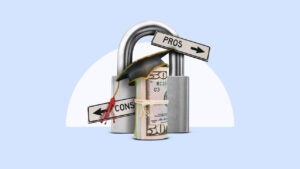Types of private student loans and how to choose

Key takeaways
- Private student loans are designed to cover educational expenses and are available through banks, credit unions and online lenders.
- Types of private student loans include degree-specific, parent, international student, bad credit, state-specific, income share agreements and refinancing options.
- Comparing multiple lenders, assessing interest rates and reviewing repayment terms are crucial to securing the best deal.
Private student loans are a type of personal loan specifically designed to pay for education-related expenses. These loans are offered by banks, credit unions, state agencies, universities and online lenders. Private student loans can serve as a lifeline when other forms of aid fall short, as many lenders offer amounts equal to your full cost of attendance.
Keep in mind that these loans are not a one-size-fits-all type of product. You’ll need to compare multiple options before deciding on one to get the best loan for your needs.
7 common types of private student loans
1. Degree-specific loans
On a basic level, private lenders typically offer undergraduate and graduate student loans. Some may also go beyond that with degree-specific loans for business school, law degrees, medical, as well as dental. You may even be able to get a loan to cover costs while you study for the bar exam or for your time at a community college.
Degree-specific loans may have perks uniquely tailored to the needs of that program. For instance, medical school loans tend to offer higher loan limits and longer grace periods compared to those offered for other graduate degrees to accommodate the significant cost and multiyear commitment that comes with medical study and credentialing.
2. Parent loans
Some private lenders offer education loans issued to the parent or parents of the student. Parent loans typically function like any other private student loan in terms of interest rates, repayment terms and grace periods. The difference is that the parent — not the student — will be responsible for making payments.
If you’re a parent looking to take out a loan for your child’s education but don’t want to be the sole one responsible, you can also look into cosigning. Some private student loans even offer a cosigner release, which means you could be taken off the loan after a set number of consecutive, on-time payments.
3. International student loans
International students may have a hard time getting approved for credit when they need it. One reason for this is that some lenders see them as higher-risk borrowers and may not lend to noncitizens. Many of these students cannot apply for federal student aid, either, as the Federal Application for Student Aid (FAFSA) requires eligibility components that include citizenship or eligible noncitizen status, as well as a Social Security number.
Some lenders specialize in student loans for international students who may not meet the standard requirements for traditional private loans, though international students may need to have a cosigner who is a U.S. citizen to be approved. These loans also typically come with higher-than-average interest rates.
4. Bad credit loans
If you need student loans and your credit history is poor or nonexistent, your best bet is federal student loans because they typically don’t require a credit check. Some lenders do offer bad credit student loans, which have less stringent credit requirements for college students who haven’t had the chance to build credit.
Bad credit private student loans usually consider factors other than your credit profile to qualify for borrowing, such as future career earnings and your field of study. On the downside, because these loans represent more risk, they tend to come with higher rates and fees than the average private loan.
If possible, look for a lender that allows cosigners, which may help you secure a lower rate. Just keep in mind that the cosigner is equally responsible for the loan.

Best student loans without a cosigner
Don't have a cosigner in tow? Explore these lenders who offer student loans without one.
Learn more5. State-specific loan programs
Many states offer private student loans through a specific state agency. Examples include the Rhode Island Student Loan Authority (RISLA), the Iowa Student Loan (ISL) Education Lending and the Bank of North Dakota.
These private student loans are typically reserved for students who are attending a college within the state’s borders, but some also offer loans for residents who are studying in another state. Eligibility requirements for these loans are based on the lender and will vary.
6. Income share agreements
Income share agreements function differently than traditional student loans. Instead of making a fixed monthly payment based on your student loan balance and an interest rate, you’ll pay a percentage of your income over a fixed number of years.
Before you apply for an income share agreement, figure out what the income percentage and repayment term will be. These agreements typically also have a salary floor and a payment cap to ensure that both parties are treated fairly.
7. Refinanced student loans
Several private financial institutions offer products to refinance student loans — private student loans used to consolidate your existing student debt. Refinancing your student loans might make sense if you can qualify for a lower rate, potentially saving you thousands of dollars in interest.
In addition, refinancing a loan with a longer term can make your monthly loan payments more affordable, but doing so will have you paying more interest over the life of the new loan. You’ll also lose access to federally sponsored repayment or forgiveness programs if you refinance federal loans with a private lender.
How to determine which private student loan works best for you
The best private student loan for you depends on your unique circumstances and priorities. Whether you’re looking for the lowest interest rate possible, discounts, unique perks or flexible repayment terms will all influence which private student loan best suits you.
Bankrate senior editor Courtney Mihocik and her sister were the first ones in the family to finance college with private student loans. Having no one to easily refer to, they were not aware they should shop around for rates: “I honestly just went with the first lender my mom told me to apply for: Wells Fargo,” she said.
She eventually refinanced her loan for a better rate with Earnest, a fintech company.
I would recommend fintech companies because they tend to have more terms customization, lower rates – with discounts for auto-pay – easier refinancing and better user interface.— Courtney Mihocik, senior Bankrate credit cards editor
As Mihocik suggests, you should consider multiple applications to compare the rates and terms you qualify for with different companies. Such applications typically require a hard credit check, so limiting your applications to a short time window can help minimize the impact on your credit score.
Regardless of which loan type you select, use a student loan calculator to estimate the cost of the loans you’re offered. This will likely be a financial commitment for years after graduation, so you’ll want to feel comfortable with the loan product and lender you select.
How to compare private student lenders
When shopping for a private student loan, consider the following:
- Interest rates: Fixed vs. variable rates, and potential rate discounts.
- Fees: Origination fees, prepayment penalties and late fees.
- Loan terms: Repayment length and deferment options.
- Borrower protections: Forbearance and deferment, as well as cosigner release.
- Customer reviews: Feedback from current and past borrowers can provide insight into lender reliability and overall borrowing experience.
Pros and cons of private student loans
Private student loans can provide valuable financial assistance when federal aid falls short, but they come with their own set of pros and cons. Understanding these different advantages and drawbacks can help you make a more informed decision about whether a private student loan is the right choice for you.

Pros
- Flexible borrowing limits
- Options for refinancing
- Potential rate discounts with autopay

Cons
- Higher interest rates for those without a cosigner
- No federal repayment protections
- Varies by lender, so terms are not standardized
Bottom line
Federal student loans, with benefits like income-driven repayment and access to student loan forgiveness, should be your first option to pay for college expenses when scholarships and grants aren’t enough. But once you’ve exhausted other options, private student loans can help provide additional funds, bridging the gap in educational expenses.
Before committing to any student loan, calculate the numbers and ensure you find the best option for your future finances. Compare the interest rates and terms you qualify for, and know that the fine print can vary significantly from lender to lender.
Frequently asked questions
Why we ask for feedback Your feedback helps us improve our content and services. It takes less than a minute to complete.
Your responses are anonymous and will only be used for improving our website.






